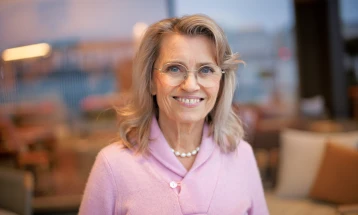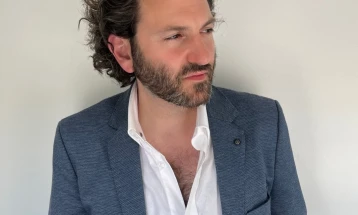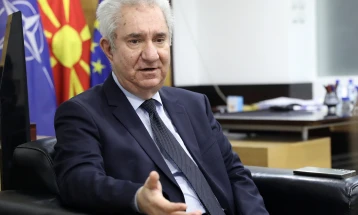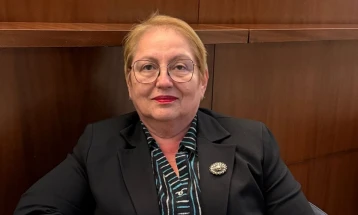Money is not always the imperative behind the decision young people make to leave their country
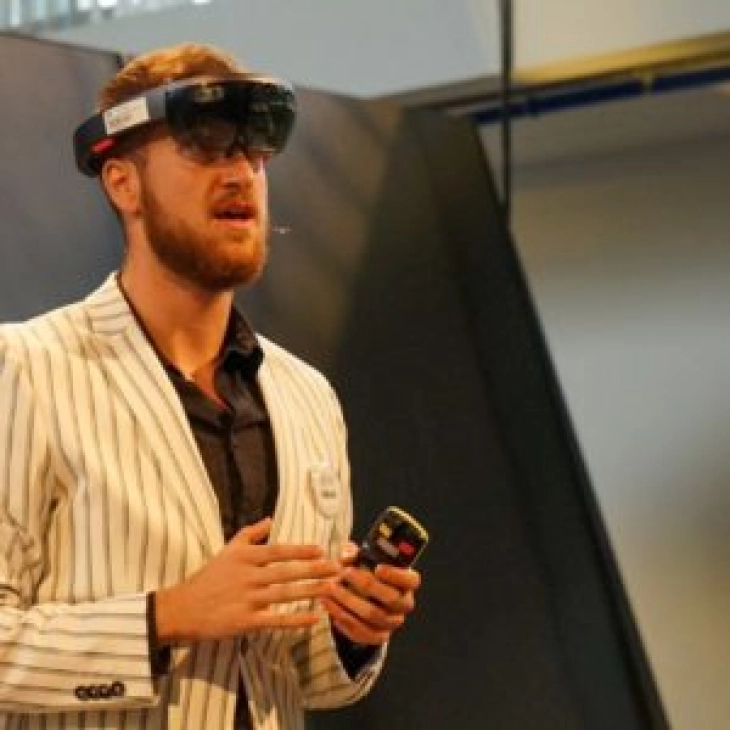
Ohrid, 28 April 2021 (MIA) - Why do young people leave this country? What are the reasons, what’s their reasoning behind leaving the home hearth and trying to build a future elsewhere? Is it always inspired by material benefits or is there something else making them leave everything and go abroad, oftentimes forever?
One such person is Nikola Budjakoski from Ohrid, a young man who’s an electronics and IT engineer that graduated from the Department of Computer Systemic Engineering, Automatics and Robotics at the Faculty of Computer Science and Engineering in Skopje. As a receiver of a scholarship in the IT sector, he started his professional career as a math, programming and robotics demonstrator, as well as a trainee in the ODV Electric company in their Germany branch.
He lives and works in the German state of Bavaria, with a master’s degree in computer sciences in the domain of biomedical programming at the Department of Computer Aided Medical Procedures – CAMP at the Faculty of Faculty of Computer Sciences and Math at the Munich Technical University. He’s an assistant at the German Aerospace Centre. In parallel to his academic and professional arrangements, Budjakoski is a Generation M activist, as a regional representative of Germany at United Macedonian Diaspora, an organization which fights for the promotion of the Macedonian language, culture and tradition, as well as conducting Academy of Humanity actions that organize educational events where they’re needed.
At the beginning of the conversation, Budjakoski distances himself from the general impression that exists in North Macedonia that the leading reason to leave the homeland is money and bigger earnings. For some people, that may be the case, but he wants to speak from the perspective of ambitious Macedonian students who want to see the world and learn more. Financial gains weren’t even on his personal top 10 list of reasons to leave.
 “Engineers or programmers in Macedonia can earn enough, or even a lot, so money should never be an imperative. My starting point was to weigh out my strengths and professional opportunities, as well as to avoid being too saturated in one spot. Maybe there was a bit of a challenge there too, I wanted to research, start from scratch, be a nobody in a strange territory with strange people. I wanted to get out of my comfort zone and see how much I can do in a world of confirmed high criteria and standards, all alone, with no connections or acquaintanceships. I believe that anyone who’s left the homeland knows how hard it is to build a new life. I wanted to meet new people, different cultures, different mentalities and ways of thinking, as well as working on the latest technologies, to learn from the best in an ambience where technological inventions are created. I wanted to absorb as much as I could from the world and give it a part of my personality, as well as our culture and tradition,” he says.
He chose Germany as the country where he wanted to achieve his goals and ideas because of the nearly free education in comparison to other technologically advanced countries in Europe and across the world. A semester of post-graduate studies at the Munich Technical University costs nearly identically to a semester of undergraduate studies in Macedonia at the Ss. Cyril and Methodius University.
“Anyone studying at a world-renowned university knows that education and study expenses, especially at prestigious universities, are a very high, financially exhaustive investment. Germany offers quality education at prices close to Macedonian standards. There is an option to work while you study, so you can give yourself the opportunity to have a quality education at a world-renowned university even without any sort of scholarship, Budjakoski says. The second reason is the undeniable fact that Germany is a powerful force in modern European life, a cradle of many advanced technologies that offers unbelievable professional opportunities.
The choice of the Munich Technical University and the program he did his postgraduate degree in was his idea from high school, with a wish for academic upgrade as a dominant cradle through practical work leading to additional knowledge and huge international experience with high criteria.
“The decision for me to direct myself towards aiding medicine came from my everyday life and my own experiences with wrong or missed diagnoses of the people we love. Today, in the midst of a pandemic, we can see how much we need technology, especially in medicine, so humanity can survive. Aids, improved diagnoses, surgeries, procedures that will help not only doctors, but patients as well are needed. So, when I was choosing a direction to pour my experience into, I chose biomedical programming, a program taught in English that studies different solutions from the sphere of engineering and computer sciences for the needs of medicine. My special interest is operation room robotics, something I want to dedicate my further work to,” Budjakoski says. He is part of the expert team that’s working on the technology for mechatronic medical aids.
“Engineers or programmers in Macedonia can earn enough, or even a lot, so money should never be an imperative. My starting point was to weigh out my strengths and professional opportunities, as well as to avoid being too saturated in one spot. Maybe there was a bit of a challenge there too, I wanted to research, start from scratch, be a nobody in a strange territory with strange people. I wanted to get out of my comfort zone and see how much I can do in a world of confirmed high criteria and standards, all alone, with no connections or acquaintanceships. I believe that anyone who’s left the homeland knows how hard it is to build a new life. I wanted to meet new people, different cultures, different mentalities and ways of thinking, as well as working on the latest technologies, to learn from the best in an ambience where technological inventions are created. I wanted to absorb as much as I could from the world and give it a part of my personality, as well as our culture and tradition,” he says.
He chose Germany as the country where he wanted to achieve his goals and ideas because of the nearly free education in comparison to other technologically advanced countries in Europe and across the world. A semester of post-graduate studies at the Munich Technical University costs nearly identically to a semester of undergraduate studies in Macedonia at the Ss. Cyril and Methodius University.
“Anyone studying at a world-renowned university knows that education and study expenses, especially at prestigious universities, are a very high, financially exhaustive investment. Germany offers quality education at prices close to Macedonian standards. There is an option to work while you study, so you can give yourself the opportunity to have a quality education at a world-renowned university even without any sort of scholarship, Budjakoski says. The second reason is the undeniable fact that Germany is a powerful force in modern European life, a cradle of many advanced technologies that offers unbelievable professional opportunities.
The choice of the Munich Technical University and the program he did his postgraduate degree in was his idea from high school, with a wish for academic upgrade as a dominant cradle through practical work leading to additional knowledge and huge international experience with high criteria.
“The decision for me to direct myself towards aiding medicine came from my everyday life and my own experiences with wrong or missed diagnoses of the people we love. Today, in the midst of a pandemic, we can see how much we need technology, especially in medicine, so humanity can survive. Aids, improved diagnoses, surgeries, procedures that will help not only doctors, but patients as well are needed. So, when I was choosing a direction to pour my experience into, I chose biomedical programming, a program taught in English that studies different solutions from the sphere of engineering and computer sciences for the needs of medicine. My special interest is operation room robotics, something I want to dedicate my further work to,” Budjakoski says. He is part of the expert team that’s working on the technology for mechatronic medical aids.
 He doesn’t think that technology is about to replace doctors. On the contrary, it’s not their idea at all to put robots before man. The intention is to create an environment in which medical specialists will work faster, more efficiently and precisely thanks for robot.
“The lead actor would still be the doctor, the robot would still be a tool to perform repetitive procedures that require calmness, precision, even more effective treatments for faster recovery. On the other hand, software solutions would enable faster diagnosing and disease detection. This way, such solutions would be used in the treatment of known illnesses and standardized procedures that would give doctors more time to focus on research and discovering new illnesses,” Budjakoski says.
About what it’s like to work and get an education at the same time in a city like Munich, Budjakoski says it’s not simple because the school itself is highly demanding, the material in every subject is extensive and requires daily work, and the same goes for work. As he says, the level of effort is high, it requires continuous everyday work, discipline, lost free time to reading, upgrading, researching and further training. He gets everything done if he just plans things well, he says.
Looking back at his Macedonian education, Budjakoski is pleased with the knowledge pool he brought with him. But, he points out the problems that exist in Macedonian society, the obstacles standing before any young person that he faced himself and believes they generally exist, separating himself from the exceptions.
“The first, basic thing that has to change in Macedonian mentality is the opinion that education is an obligation. One should get an education because they want to learn more, regardless of the area. That would entail not going to university pressured by parents or society. The concept of straight As hangs over students all the way through elementary and high school, a dysfunctional, forced premise. It creates a dysfunctional system of powerful parents with complexes and vasal teachers who are unfair and fulfill these wishes where the child has to be pushed to perfect grades no matter what. I believe that the wrong message is sent to the students from an early age, who, instead of enjoying their education and expressing a wish to prove themselves, education is perceived as a burden and obligation to the parent or professor,” he says.
His personal impression when it comes to higher education in Macedonia is that everyone seems to fight to get more with minimal effort and to cross the line of least resistance as if it’s becoming a rule. Lots of people start going to university because society forces them to, and the accent is put on having a diploma, sometimes of dubious quality.
“I think that, once and for all, we need to understand that not everyone needs a diploma. Everyone should find their interest and specialty and decide how they’re going to continue upgrading it, regardless of if they decide to do a trade, start going to university, a private academy or a professional career after their mandatory education ends. Higher education in Macedonia lacks investments, especially in technical sciences, as well as equipment, labs, scientific events, improved lab practices and cooperating with the industry for better practices. I sincerely hope that someday we will go beyond the moment in exams where a student has to parrot the answer from A to Z as if they’re not academic citizens meant to change society for the better,” Budjakoski says.
He doesn’t think that technology is about to replace doctors. On the contrary, it’s not their idea at all to put robots before man. The intention is to create an environment in which medical specialists will work faster, more efficiently and precisely thanks for robot.
“The lead actor would still be the doctor, the robot would still be a tool to perform repetitive procedures that require calmness, precision, even more effective treatments for faster recovery. On the other hand, software solutions would enable faster diagnosing and disease detection. This way, such solutions would be used in the treatment of known illnesses and standardized procedures that would give doctors more time to focus on research and discovering new illnesses,” Budjakoski says.
About what it’s like to work and get an education at the same time in a city like Munich, Budjakoski says it’s not simple because the school itself is highly demanding, the material in every subject is extensive and requires daily work, and the same goes for work. As he says, the level of effort is high, it requires continuous everyday work, discipline, lost free time to reading, upgrading, researching and further training. He gets everything done if he just plans things well, he says.
Looking back at his Macedonian education, Budjakoski is pleased with the knowledge pool he brought with him. But, he points out the problems that exist in Macedonian society, the obstacles standing before any young person that he faced himself and believes they generally exist, separating himself from the exceptions.
“The first, basic thing that has to change in Macedonian mentality is the opinion that education is an obligation. One should get an education because they want to learn more, regardless of the area. That would entail not going to university pressured by parents or society. The concept of straight As hangs over students all the way through elementary and high school, a dysfunctional, forced premise. It creates a dysfunctional system of powerful parents with complexes and vasal teachers who are unfair and fulfill these wishes where the child has to be pushed to perfect grades no matter what. I believe that the wrong message is sent to the students from an early age, who, instead of enjoying their education and expressing a wish to prove themselves, education is perceived as a burden and obligation to the parent or professor,” he says.
His personal impression when it comes to higher education in Macedonia is that everyone seems to fight to get more with minimal effort and to cross the line of least resistance as if it’s becoming a rule. Lots of people start going to university because society forces them to, and the accent is put on having a diploma, sometimes of dubious quality.
“I think that, once and for all, we need to understand that not everyone needs a diploma. Everyone should find their interest and specialty and decide how they’re going to continue upgrading it, regardless of if they decide to do a trade, start going to university, a private academy or a professional career after their mandatory education ends. Higher education in Macedonia lacks investments, especially in technical sciences, as well as equipment, labs, scientific events, improved lab practices and cooperating with the industry for better practices. I sincerely hope that someday we will go beyond the moment in exams where a student has to parrot the answer from A to Z as if they’re not academic citizens meant to change society for the better,” Budjakoski says.
 The opportunity to learn from teachers who don’t just teach from the books, but the teachers who taught him were the ones who started developing the technology they teach or work and develop was the biggest thing that drew him to upgrade his education in Germany. Each lesson comes from experiences, they learn from a detected problem, how it can be solved, what are its challenges, results, and what sorts of improvements are necessary.
“You’re practically presented with personal, firsthand experience. In comparison, in Macedonia you learn the concept, but you don’t know why it exists and where it’s applicable. The level of equipment in labs here are at the pinnacle of modern technology, with a huge selection of practical subjects to study. When choosing a practical subject, the student works on projects, so they can build their own education that will be a perfect balance between theory and practice. I hope there will come a time in our country where we learn that education is one of the most important investments and that knowledge is receiving more investments than there is capacity. There are talented students in our country, but I believe that many things are necessary to be improved for proper realization,” he says.
Budjakoski has a master degree in robotics and has been working for 2 years as an assistant in the German Aerospace Centre where he works on algorithms and concepts for a medical robot for research purposes that would be used in an operating room. His intention is to start his own research work in the field, with an ambition to find the topic of his doctor dissertation through the process of perfecting the existing topic.
Aleksandar Bachikj
Translated by Dragana Knezhevikj
The opportunity to learn from teachers who don’t just teach from the books, but the teachers who taught him were the ones who started developing the technology they teach or work and develop was the biggest thing that drew him to upgrade his education in Germany. Each lesson comes from experiences, they learn from a detected problem, how it can be solved, what are its challenges, results, and what sorts of improvements are necessary.
“You’re practically presented with personal, firsthand experience. In comparison, in Macedonia you learn the concept, but you don’t know why it exists and where it’s applicable. The level of equipment in labs here are at the pinnacle of modern technology, with a huge selection of practical subjects to study. When choosing a practical subject, the student works on projects, so they can build their own education that will be a perfect balance between theory and practice. I hope there will come a time in our country where we learn that education is one of the most important investments and that knowledge is receiving more investments than there is capacity. There are talented students in our country, but I believe that many things are necessary to be improved for proper realization,” he says.
Budjakoski has a master degree in robotics and has been working for 2 years as an assistant in the German Aerospace Centre where he works on algorithms and concepts for a medical robot for research purposes that would be used in an operating room. His intention is to start his own research work in the field, with an ambition to find the topic of his doctor dissertation through the process of perfecting the existing topic.
Aleksandar Bachikj
Translated by Dragana Knezhevikj
 “Engineers or programmers in Macedonia can earn enough, or even a lot, so money should never be an imperative. My starting point was to weigh out my strengths and professional opportunities, as well as to avoid being too saturated in one spot. Maybe there was a bit of a challenge there too, I wanted to research, start from scratch, be a nobody in a strange territory with strange people. I wanted to get out of my comfort zone and see how much I can do in a world of confirmed high criteria and standards, all alone, with no connections or acquaintanceships. I believe that anyone who’s left the homeland knows how hard it is to build a new life. I wanted to meet new people, different cultures, different mentalities and ways of thinking, as well as working on the latest technologies, to learn from the best in an ambience where technological inventions are created. I wanted to absorb as much as I could from the world and give it a part of my personality, as well as our culture and tradition,” he says.
He chose Germany as the country where he wanted to achieve his goals and ideas because of the nearly free education in comparison to other technologically advanced countries in Europe and across the world. A semester of post-graduate studies at the Munich Technical University costs nearly identically to a semester of undergraduate studies in Macedonia at the Ss. Cyril and Methodius University.
“Anyone studying at a world-renowned university knows that education and study expenses, especially at prestigious universities, are a very high, financially exhaustive investment. Germany offers quality education at prices close to Macedonian standards. There is an option to work while you study, so you can give yourself the opportunity to have a quality education at a world-renowned university even without any sort of scholarship, Budjakoski says. The second reason is the undeniable fact that Germany is a powerful force in modern European life, a cradle of many advanced technologies that offers unbelievable professional opportunities.
The choice of the Munich Technical University and the program he did his postgraduate degree in was his idea from high school, with a wish for academic upgrade as a dominant cradle through practical work leading to additional knowledge and huge international experience with high criteria.
“The decision for me to direct myself towards aiding medicine came from my everyday life and my own experiences with wrong or missed diagnoses of the people we love. Today, in the midst of a pandemic, we can see how much we need technology, especially in medicine, so humanity can survive. Aids, improved diagnoses, surgeries, procedures that will help not only doctors, but patients as well are needed. So, when I was choosing a direction to pour my experience into, I chose biomedical programming, a program taught in English that studies different solutions from the sphere of engineering and computer sciences for the needs of medicine. My special interest is operation room robotics, something I want to dedicate my further work to,” Budjakoski says. He is part of the expert team that’s working on the technology for mechatronic medical aids.
“Engineers or programmers in Macedonia can earn enough, or even a lot, so money should never be an imperative. My starting point was to weigh out my strengths and professional opportunities, as well as to avoid being too saturated in one spot. Maybe there was a bit of a challenge there too, I wanted to research, start from scratch, be a nobody in a strange territory with strange people. I wanted to get out of my comfort zone and see how much I can do in a world of confirmed high criteria and standards, all alone, with no connections or acquaintanceships. I believe that anyone who’s left the homeland knows how hard it is to build a new life. I wanted to meet new people, different cultures, different mentalities and ways of thinking, as well as working on the latest technologies, to learn from the best in an ambience where technological inventions are created. I wanted to absorb as much as I could from the world and give it a part of my personality, as well as our culture and tradition,” he says.
He chose Germany as the country where he wanted to achieve his goals and ideas because of the nearly free education in comparison to other technologically advanced countries in Europe and across the world. A semester of post-graduate studies at the Munich Technical University costs nearly identically to a semester of undergraduate studies in Macedonia at the Ss. Cyril and Methodius University.
“Anyone studying at a world-renowned university knows that education and study expenses, especially at prestigious universities, are a very high, financially exhaustive investment. Germany offers quality education at prices close to Macedonian standards. There is an option to work while you study, so you can give yourself the opportunity to have a quality education at a world-renowned university even without any sort of scholarship, Budjakoski says. The second reason is the undeniable fact that Germany is a powerful force in modern European life, a cradle of many advanced technologies that offers unbelievable professional opportunities.
The choice of the Munich Technical University and the program he did his postgraduate degree in was his idea from high school, with a wish for academic upgrade as a dominant cradle through practical work leading to additional knowledge and huge international experience with high criteria.
“The decision for me to direct myself towards aiding medicine came from my everyday life and my own experiences with wrong or missed diagnoses of the people we love. Today, in the midst of a pandemic, we can see how much we need technology, especially in medicine, so humanity can survive. Aids, improved diagnoses, surgeries, procedures that will help not only doctors, but patients as well are needed. So, when I was choosing a direction to pour my experience into, I chose biomedical programming, a program taught in English that studies different solutions from the sphere of engineering and computer sciences for the needs of medicine. My special interest is operation room robotics, something I want to dedicate my further work to,” Budjakoski says. He is part of the expert team that’s working on the technology for mechatronic medical aids.
 He doesn’t think that technology is about to replace doctors. On the contrary, it’s not their idea at all to put robots before man. The intention is to create an environment in which medical specialists will work faster, more efficiently and precisely thanks for robot.
“The lead actor would still be the doctor, the robot would still be a tool to perform repetitive procedures that require calmness, precision, even more effective treatments for faster recovery. On the other hand, software solutions would enable faster diagnosing and disease detection. This way, such solutions would be used in the treatment of known illnesses and standardized procedures that would give doctors more time to focus on research and discovering new illnesses,” Budjakoski says.
About what it’s like to work and get an education at the same time in a city like Munich, Budjakoski says it’s not simple because the school itself is highly demanding, the material in every subject is extensive and requires daily work, and the same goes for work. As he says, the level of effort is high, it requires continuous everyday work, discipline, lost free time to reading, upgrading, researching and further training. He gets everything done if he just plans things well, he says.
Looking back at his Macedonian education, Budjakoski is pleased with the knowledge pool he brought with him. But, he points out the problems that exist in Macedonian society, the obstacles standing before any young person that he faced himself and believes they generally exist, separating himself from the exceptions.
“The first, basic thing that has to change in Macedonian mentality is the opinion that education is an obligation. One should get an education because they want to learn more, regardless of the area. That would entail not going to university pressured by parents or society. The concept of straight As hangs over students all the way through elementary and high school, a dysfunctional, forced premise. It creates a dysfunctional system of powerful parents with complexes and vasal teachers who are unfair and fulfill these wishes where the child has to be pushed to perfect grades no matter what. I believe that the wrong message is sent to the students from an early age, who, instead of enjoying their education and expressing a wish to prove themselves, education is perceived as a burden and obligation to the parent or professor,” he says.
His personal impression when it comes to higher education in Macedonia is that everyone seems to fight to get more with minimal effort and to cross the line of least resistance as if it’s becoming a rule. Lots of people start going to university because society forces them to, and the accent is put on having a diploma, sometimes of dubious quality.
“I think that, once and for all, we need to understand that not everyone needs a diploma. Everyone should find their interest and specialty and decide how they’re going to continue upgrading it, regardless of if they decide to do a trade, start going to university, a private academy or a professional career after their mandatory education ends. Higher education in Macedonia lacks investments, especially in technical sciences, as well as equipment, labs, scientific events, improved lab practices and cooperating with the industry for better practices. I sincerely hope that someday we will go beyond the moment in exams where a student has to parrot the answer from A to Z as if they’re not academic citizens meant to change society for the better,” Budjakoski says.
He doesn’t think that technology is about to replace doctors. On the contrary, it’s not their idea at all to put robots before man. The intention is to create an environment in which medical specialists will work faster, more efficiently and precisely thanks for robot.
“The lead actor would still be the doctor, the robot would still be a tool to perform repetitive procedures that require calmness, precision, even more effective treatments for faster recovery. On the other hand, software solutions would enable faster diagnosing and disease detection. This way, such solutions would be used in the treatment of known illnesses and standardized procedures that would give doctors more time to focus on research and discovering new illnesses,” Budjakoski says.
About what it’s like to work and get an education at the same time in a city like Munich, Budjakoski says it’s not simple because the school itself is highly demanding, the material in every subject is extensive and requires daily work, and the same goes for work. As he says, the level of effort is high, it requires continuous everyday work, discipline, lost free time to reading, upgrading, researching and further training. He gets everything done if he just plans things well, he says.
Looking back at his Macedonian education, Budjakoski is pleased with the knowledge pool he brought with him. But, he points out the problems that exist in Macedonian society, the obstacles standing before any young person that he faced himself and believes they generally exist, separating himself from the exceptions.
“The first, basic thing that has to change in Macedonian mentality is the opinion that education is an obligation. One should get an education because they want to learn more, regardless of the area. That would entail not going to university pressured by parents or society. The concept of straight As hangs over students all the way through elementary and high school, a dysfunctional, forced premise. It creates a dysfunctional system of powerful parents with complexes and vasal teachers who are unfair and fulfill these wishes where the child has to be pushed to perfect grades no matter what. I believe that the wrong message is sent to the students from an early age, who, instead of enjoying their education and expressing a wish to prove themselves, education is perceived as a burden and obligation to the parent or professor,” he says.
His personal impression when it comes to higher education in Macedonia is that everyone seems to fight to get more with minimal effort and to cross the line of least resistance as if it’s becoming a rule. Lots of people start going to university because society forces them to, and the accent is put on having a diploma, sometimes of dubious quality.
“I think that, once and for all, we need to understand that not everyone needs a diploma. Everyone should find their interest and specialty and decide how they’re going to continue upgrading it, regardless of if they decide to do a trade, start going to university, a private academy or a professional career after their mandatory education ends. Higher education in Macedonia lacks investments, especially in technical sciences, as well as equipment, labs, scientific events, improved lab practices and cooperating with the industry for better practices. I sincerely hope that someday we will go beyond the moment in exams where a student has to parrot the answer from A to Z as if they’re not academic citizens meant to change society for the better,” Budjakoski says.
 The opportunity to learn from teachers who don’t just teach from the books, but the teachers who taught him were the ones who started developing the technology they teach or work and develop was the biggest thing that drew him to upgrade his education in Germany. Each lesson comes from experiences, they learn from a detected problem, how it can be solved, what are its challenges, results, and what sorts of improvements are necessary.
“You’re practically presented with personal, firsthand experience. In comparison, in Macedonia you learn the concept, but you don’t know why it exists and where it’s applicable. The level of equipment in labs here are at the pinnacle of modern technology, with a huge selection of practical subjects to study. When choosing a practical subject, the student works on projects, so they can build their own education that will be a perfect balance between theory and practice. I hope there will come a time in our country where we learn that education is one of the most important investments and that knowledge is receiving more investments than there is capacity. There are talented students in our country, but I believe that many things are necessary to be improved for proper realization,” he says.
Budjakoski has a master degree in robotics and has been working for 2 years as an assistant in the German Aerospace Centre where he works on algorithms and concepts for a medical robot for research purposes that would be used in an operating room. His intention is to start his own research work in the field, with an ambition to find the topic of his doctor dissertation through the process of perfecting the existing topic.
Aleksandar Bachikj
Translated by Dragana Knezhevikj
The opportunity to learn from teachers who don’t just teach from the books, but the teachers who taught him were the ones who started developing the technology they teach or work and develop was the biggest thing that drew him to upgrade his education in Germany. Each lesson comes from experiences, they learn from a detected problem, how it can be solved, what are its challenges, results, and what sorts of improvements are necessary.
“You’re practically presented with personal, firsthand experience. In comparison, in Macedonia you learn the concept, but you don’t know why it exists and where it’s applicable. The level of equipment in labs here are at the pinnacle of modern technology, with a huge selection of practical subjects to study. When choosing a practical subject, the student works on projects, so they can build their own education that will be a perfect balance between theory and practice. I hope there will come a time in our country where we learn that education is one of the most important investments and that knowledge is receiving more investments than there is capacity. There are talented students in our country, but I believe that many things are necessary to be improved for proper realization,” he says.
Budjakoski has a master degree in robotics and has been working for 2 years as an assistant in the German Aerospace Centre where he works on algorithms and concepts for a medical robot for research purposes that would be used in an operating room. His intention is to start his own research work in the field, with an ambition to find the topic of his doctor dissertation through the process of perfecting the existing topic.
Aleksandar Bachikj
Translated by Dragana Knezhevikj 
